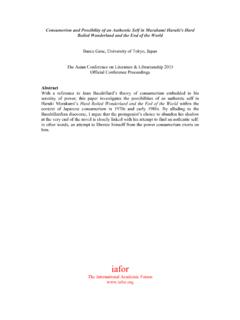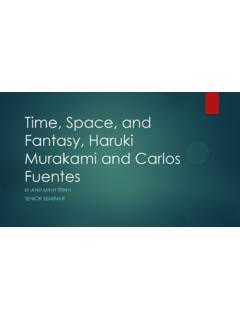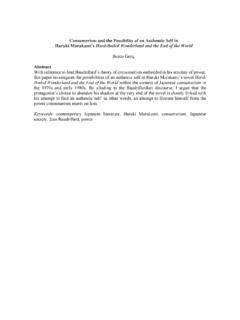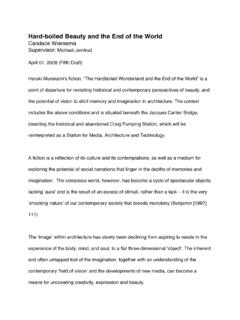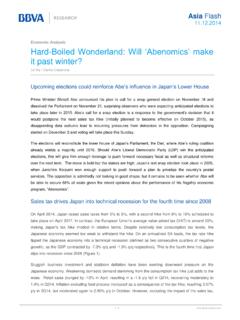Transcription of Haruki, Murakami - The Wind-Up Bird Chronicle
1 J T h e W i n d - U p bird C h r o n i c l e H A R U K I M U R A K A M I Translated from the Japanese by J A Y R U B I N H A R U K I M U R A K A M I Haruki Murakami was born in Kyoto in 1949 and now lives near Tokyo. The most recent of his many honors is the Yomiuri Literary Prize, whose previous recipients include Yukio Mishima, Kenzaburd Oe, and Kdbo Abe. He is the author of the novels Dance Dance Dance, hard - boiled wonderland and the End of the World, and A Wild Sheep Chase, and of The Elephant Vanishes, a collection of stories. His latest novel, South of the Border, West of the Sun, will be published by Knopf in 1999. His work has been translated into fourteen languages. B o o k O n e: T h e T h i e v i n g Magpie June a n d J u l y 1 9 8 4 1 Tuesday s Wind-Up bird * Six Fingers and Four Breasts When the phone rang I was in the kitchen, boiling a potrul of spaghetti and whistling along with an FM broadcast of the overture to Rossini s The Thieving Magpie, which has to be the perfect music for cooking pasta.
2 I wanted to ignore the phone, not only because the spaghetti was nearly done, but because Claudio Abbado was bringing the London Symphony to its musical climax. Finally, though, I had to give in. It could have been somebody with news of a job opening. I lowered the flame, went to the living room, and picked up the receiver. Ten minutes, please, said a woman on the other end. I m good at recognizing people s voices, but this was not one I knew. Excuse me? To whom did you wish to speak? To you, of course. Ten minutes, please. That s all we need to understand each other. Her voice was low and soft but otherwise nondescript. Understand each other? Each other s feelings. I leaned over and peeked through the kitchen door. The spaghetti pot was steaming nicely, and Claudio Abbado was still conducting The Thieving Magpie. Sorry, but you caught me in the middle of making spaghetti. Can I ask you to call back later? Spaghetti!? What are you doing cooking spaghetti at ten-thirty in the morning?
3 That s none of your business, I said. I decide what I eat and when I eat it. True enough. I ll call back, she said, her voice now flat and expressionless. A little change in mood can do amazing things to the tone of a person s voice. Hold on a minute, I said before she could hang up. If this is some new sales gimmick, you can forget it. I m out of work. I m not in the market for anything. Don t worry. I know. You know? You know what? That you re out of work. I know about that. So go cook your precious spaghetti. Who the hell- She cut the connection. With no outlet for my feelings, I stared at the phone in my hand until I remembered the spaghetti. Back in the kitchen, I turned off the gas and poured the contents of the pot into a colander. Thanks to the phone call, the spaghetti was a little softer than al dente, but it had not been dealt a mortal blow. I started eating-and thinking. Understand each other? Understand each other s feelings in ten minutes?
4 What was she talking about? Maybe it was just a prank call. Or some new sales pitch. In any case, it had nothing to do with me. After lunch, I went back to my library novel on the living room sofa, glancing every now and then at the telephone. What were we supposed to understand about each other in ten minutes? What can two people understand about each other in ten minutes? Come to think of it, she seemed awfully sure about those ten minutes: it was the first thing out of her mouth. As if nine minutes would be too short or eleven minutes too long. Like cooking spaghetti al dente. I couldn t read anymore. I decided to iron shirts instead. Which is what I always do when I m upset. It s an old habit. I divide the job into twelve precise stages, beginning with the collar (outer surface) and ending with the left-hand cuff. The order is always the same, and I count off each stage to myself. Otherwise, it won t come out right. I ironed three shirts, checking them over for wrinkles and putting them on hangers.
5 Once I had switched off the iron and put it away with the ironing board in the hall closet, my mind felt a good deal clearer. I was on my way to the kitchen for a glass of water when the phone rang again. I hesitated for a second but decided to answer it. If it was the same woman, I d tell her I was ironing and hang up. This time it was Kumiko. The wall clock said eleven-thirty. How are you? she asked. Fine, I said, relieved to hear my wife s voice. What are you doing? Just finished ironing. What s wrong? There was a note of tension in her voice. She knew what it meant for me to be ironing. Nothing. I was just ironing some shirts. I sat down and shifted the receiver from my left hand to my right. What s up? Can you write poetry? she asked. Poetry!? Poetry? Did she mean .. poetry? I know the publisher of a story magazine for girls. They re looking for somebody to pick and revise poems submitted by readers. And they want the person to write a short poem every month for the frontispiece.
6 Pay s not bad for an easy job. Of course, it s part-time. But they might add some editorial work if the person- Easy work? I broke in. Hey, wait a minute. I m looking for something in law, not poetry. I thought you did some writing in high school. Yeah, sure, for the school newspaper: which team won the soccer championship or how the physics teacher fell down the stairs and ended up in the hospital-that kind of stuff. Not poetry. I can t write poetry. Sure, but I m not talking about great poetry, just something for high school girls. It doesn t have to find a place in literary history. You could do it with your eyes closed. Don t you see? Look, I just can t write poetry-eyes open or closed. I ve never done it, and I m not going to start now. All right, said Kumiko, with a hint of regret. But it s hard to find legal work. I know. That s why I ve got so many feelers out. I should be hearing something this week. If it s no go, I ll think about doing something else.
7 Well, I suppose that s that. By the way, what s today? What day of the week? I thought a moment and said, Tuesday. Then will you go to the bank and pay the gas and telephone? Sure. I was just about to go shopping for dinner anyway. What are you planning to make? I don t know yet. I ll decide when I m shopping. She paused. Come to think of it, she said, with a new seriousness, there s no great hurry about your finding a job. This took me off guard. Why s that? I asked. Had the women of the world chosen today to surprise me on the telephone? My unemployment s going to run out sooner or later. I can t keep hanging around forever. True, but with my raise and occasional side jobs and our savings, we can get by OK if we re careful. There s no real emergency. Do you hate staying at home like this and doing housework? I mean, is this life so wrong for you? I don t know, I answered honestly. I really didn t know. Well, take your time and give it some thought, she said.
8 Anyhow, has the cat come back? The cat. I hadn t thought about the cat all morning. No, I said. Not yet. Can you please have a look around the neighborhood? It s been gone over a week now. I gave a noncommittal grunt and shifted the receiver back to my left hand. She went on: I m almost certain it s hanging around the empty house at the other end of the alley. The one with the bird statue in the yard. I ve seen it in there several times. The alley? Since when have you been going to the alley? You ve never said anything- Oops! Got to run. Lots of work to do. Don t forget about the cat. She hung up. I found myself staring at the receiver again. Then I set it down in its cradle. I wondered what had brought Kumiko to the alley. To get there from our house, you had to climb over the cinder-block wall. And once you d made the effort, there was no point in being there. I went to the kitchen for a glass of water, then out to the veranda to look at the cat s dish.
9 The mound of sardines was untouched from last night. No, the cat had not come back. I stood there looking at our small garden, with the early-summer sunshine streaming into it. Not that ours was the kind of garden that gives you spiritual solace to look at. The sun managed to find its way in there for the smallest fraction of each day, so the earth was always black and moist, and all we had by way of garden plants were a few drab hydrangeas in one corner-and I don t like hydrangeas. There was a small stand of trees nearby, and from it you could hear the mechanical cry of a bird that sounded as if it were winding a spring. We called it the Wind-Up bird . Kumiko gave it the name. We didn t know what it was really called or what it looked like, but that didn t bother the Wind-Up bird . Every day it would come to the stand of trees in our neighborhood and wind the spring of our quiet little world. So now I had to go cat hunting. I had always liked cats. And I liked this particular cat.
10 But cats have their own way of living. They re not stupid. If a cat stopped living where you happened to be, that meant it had decided to go somewhere else. If it got tired and hungry, it would come back. Finally, though, to keep Kumiko happy, I would have to go looking for our cat. I had nothing better to do. I had quit my job at the beginning of April- the law job I had had since graduation. Not that I had quit for any special reason. I didn t dislike the work. It wasn t thrilling, but the pay was all right and the office atmosphere was friendly. My role at the firm was-not to put too fine a point on it-that of professional gofer. And I was good at it. I might say I have a real talent for the execution of such practical duties. I m a quick study, efficient, I never complain, and I m realistic. Which is why, when I said I wanted to quit, the senior partner (the father in this father-and-son law firm) went so far as to offer me a small raise. But I quit just the same.
